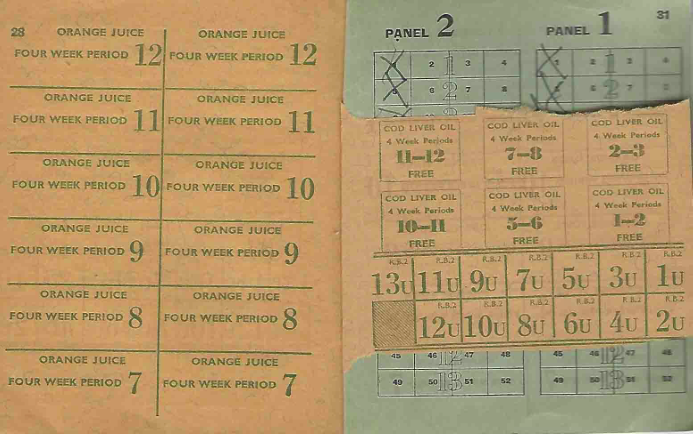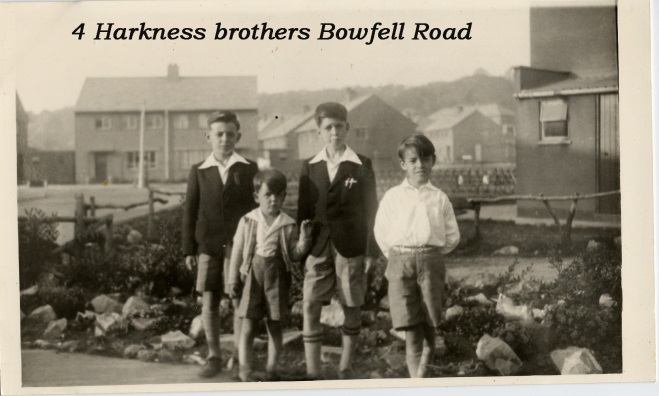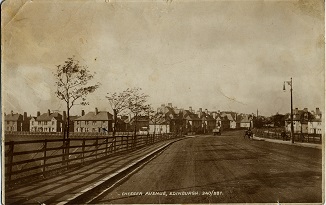The history of rationing is quite complex, as well as its effects on the evolution of people’s eating habits. Many such ‘official’ documents can be difficult to understand for the uninitiated (such as myself). As mentioned above, various foods were rationed, but not all at the same time. There was a so-called ‘rationing timeline’. The Ration Book shown here is for the period: May 1953 to May 1954. By July 1954 rationing had ended70.
Sweets and sugar rationing ended already in February 1953. It was probably around this time children stopped eating treacle on bread. Of course, one acquires a taste for something, and old habits die hard. That is, there would be a time-lag. You can read more about that in my previous post: War-time Rationing and the Period of Austerity.
It is difficult to fully interpret such a document without having the special skills of a historian of documents. It would also have been helpful to talk to the owner of the Ration Book, that is, my mother; sadly she has already passed away. But my aim here is not to carry out a full investigation of the Ration Books, but to use it as a point of illustration; so I will try.
Price Changes
The picture of the Ration Book shown here only shows two pages of the welfare foods:71 the cod liver oil is free; whereas, the orange juice costs 5d. In other words, it is subsidized. The orange juice had also been free, but I am not sure of the dates or rules here. But the government tended to reduce the availability of such welfare foods, or increase prices.
For example, by 1961, the price for cod liver oil was 1s a bottle; it had been free previously. The price of orange juice was now 1s. 6d. a bottle, while in 1953-54 it had been 5d. The book also shows the name of the shops where you can buy the rationed foods. However, it’snot shown in the picture here.
It is most likely my mother kept these Ration Books because they were the last ones she used (1953-1954) before the rationing ended. She had used some of the coupons for the free cod liver oil. However, she does not seem to have used the coupons for the subsidized orange juice for one reason or another. It could be due to the changes in the rules, or due to the cost.
The examples show us that not only were there restrictions on foods, but also free provision of welfare foods.
Orange Juice
Eating habits that evolved during rationing would still continue to some extent after the rationing ended; that is, children and adults would continue to eat foods they had eaten during the rationing.
The tastes the orange juice and the cod liver oil are both etched vividly in my memory. I can still distinctly remember the sweet, tangy taste of the orange juice which my mother used to give me. It’s impossible to match that taste with anything in the shops today.
It was orange juice concentrate made from real oranges, rich in vitamin C. They were imported most likely from the U.S. as part of the Lend-Lease package (starting during the war). I remember missing its taste when I grew older because the period of rationing and welfare foods was gradually wound down during the post-war period.
Cod Liver Oil
Apart from the tasty sips of the orange juice, there are other memorable tastes that one cannot just happily forget. The government had made special arrangements for young children, expectant women, and nursing mothers, to receive cod-liver oil supplies from welfare clinics.
You can’t forget the fishy taste of the British welfare cod liver oil! I know now of course that the cod liver oil must have been just as, if not more, nutritional than the orange juice. Although as a child, it was something you did not look forward to.
Milk Snatcher
After the period of rationing ended, other forms of welfare foods were made available by the government. One example was subsidized school dinners and free milk. However, my age mates, and those older than me, all know too well the story of the ‘witch that snatched the milk from the children’. Many did not shed a tear when they found out that the ‘witch had died’72.
Butter and Bread
A British saying that adults often use when talking to ‘lazy and spoiled’ children is ‘to want one’s bread buttered on both sides’. This means to want to benefit from something without making an effort. I wouldn’t say my mother was that strict, but sometimes she would pretend to be. If I spread my bread thick with jam and butter she would say, “A child that wants both butter AND jam on their bread is a spoiled child!”
She would follow this up by saying that her mother Morag would never allow her to spread both butter AND jam on her bread. But then my mother grew up during the crises of the 1920s and the Great Depression of the 1930s; so her mother Morag was probably ‘strict’ in the sense she had to be thrifty.
Perhaps in some ways, Morag resembled the ‘strict’ mother in Edith Nesbit’s novel, The Railway Children (1906); at least ‘strict’ in the sense she was ‘poor’ and couldn’t afford extravagancy. The ‘strict’ mother in the novel admonishes her daughter Phyllis for being ‘extravagant’:
They all went down to tea flushed and joyous as any mountain brigands. But when Phyllis was going to add jam to her bread and butter, Mother said:—“Jam OR butter, dear—not jam AND butter. We can’t afford that sort of reckless luxury nowadays.”73
In other words, as described above, Alistair and Ronny had to eat treacle on their bread WITHOUT butter.
Luxurious Food Growing Up
When I was a little older and the rationing had ended, my family were fairly well off and could afford more ‘luxurious’ food. However, the ‘poorer’ and harsh times of the 1920s up to 1940s were still firmly etched in my mother’s memory. So although she liked in one sense to ‘spoil’ us, she couldn’t resist admonishing us at the same time for being ‘extravagant’ or ‘wasteful’.
After the period of rationing ended in 1954, the British economy started to improve. It was during this period that the ‘consumer society’74 started to pick up speed. As signalled by the British prime minister, Harold MacMillan in 1957, “You’ve never had it so good.”75
In other words, I grew up in the period when there was a transition from crisis to boom; I was thus part of the so-called ‘Boomer Generation’. Of course, the phrase “You’ve never had it so good” took on a whole other meaning with the so-called ‘Profumo Affair’7677. This is the question asked more often by whores than wives, “Was It Good for You?”
Given everything discussed here, we can assume that not a lot of people know much about this period of British history. Not much is known about the rationing and welfare foods during and after the Second World War. The provision of such welfare foods was reduced over the years in order to cut government spending. Hence, the story of the witch who snatched the milk from the children existed.
Politicians who wished to cut welfare spending undoubtedly presented many ‘logical’ arguments, such as “it’s good for the economy” or “it’s a waste of resources,” and so on. In fact, there have been many heated political discussions and conflicts concerning the provision or reduction of welfare foods, which we can’t enter into here.
However, I will include a link here to one such ‘discussion and conflict’ reported in the Hansard (December 1957) concerning the proposal by the government to stop the provision of free orange juice concentrate for children between the ages of 2 and 5 years78.
So to sum up, a Ration Book, a memory of the boy next door eating treacle on bread, a photo of my brothers wearing home-made shorts, the memory of the taste of orange juice concentrate and cod liver oil, berry picking, as well as other memories, photos, artefacts, and documents all reveal layers of history on closer examination, a history one was not necessarily fully aware of when one was ‘living one’s life’.
Sources
70 http://www.primaryhomeworkhelp.co.uk/war/rationing4.html Date of reading: 31 Dec. 2021.
71 There is a slight comparison with the Covid situation today, with free vaccines, hand sanitizer and face masks.
72 Margaret Thatcher abolished free milk for children aged 7–11 in 1971.
73 https://biblioteca.agustinos.pe/opac_css/doc_num.php?explnum_id=1432
74 Consumer society is a society in which people buy new goods, and that places a high value on owning things. In a consumer society, there is no better measure of how people feel than what they buy. https://dictionary.cambridge.org/dictionary/english/consumer-society Date of reading: 31 Dec. 2021.
75 Benefiting from favourable international conditions, he presided over an age of affluence, marked by low unemployment and high—if uneven—growth. In his speech of July 1957 he told the nation it had ‘never had it so good’, https://en.wikipedia.org/wiki/Harold_Macmillan Read: 13 April 2022.
76 The Profumo affair was a major scandal in twentieth-century British politics. John Profumo, the Secretary of State for War in Harold Macmillan’s Conservative government, had an extramarital affair with 19-year-old model Christine Keeler beginning in 1961. https://en.wikipedia.org/wiki/Profumo_affair Read 13 April 2022.
77 This historical event has been turned into a musical: Stephen Ward is a musical with a book and lyrics by Don Black and Christopher Hampton, with music by Andrew Lloyd Webber. https://en.wikipedia.org/wiki/Stephen_Ward Read: 13 April 2022.
78 https://api.parliament.uk/historic-hansard/commons/1957/dec/02/welfare-foods-orange-juice Accessed 27 September 2021.




2 Replies to “The Evolution of Rationing and Eating Habits”